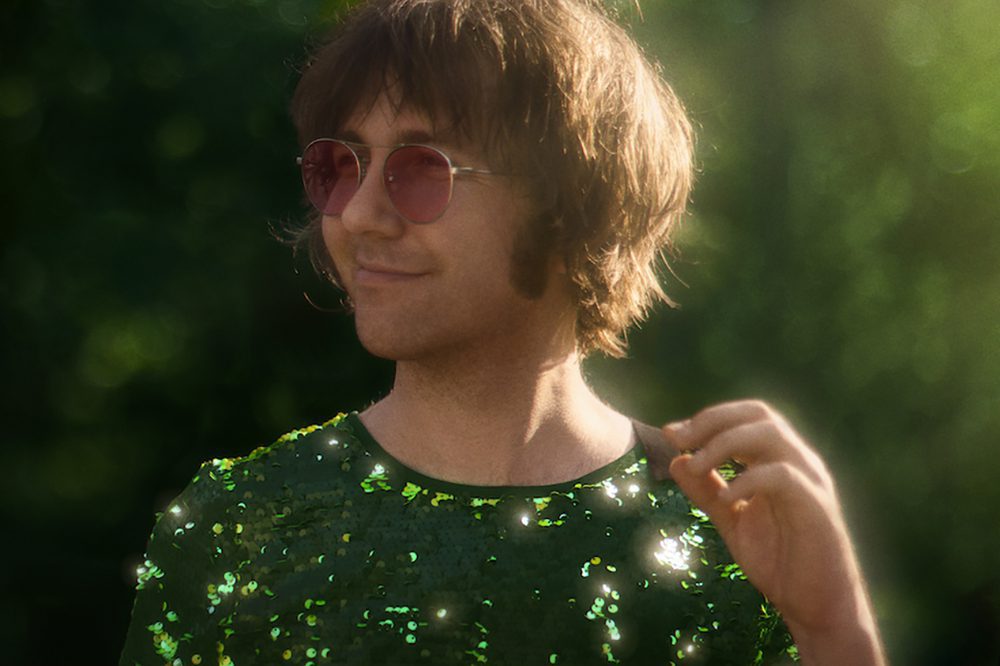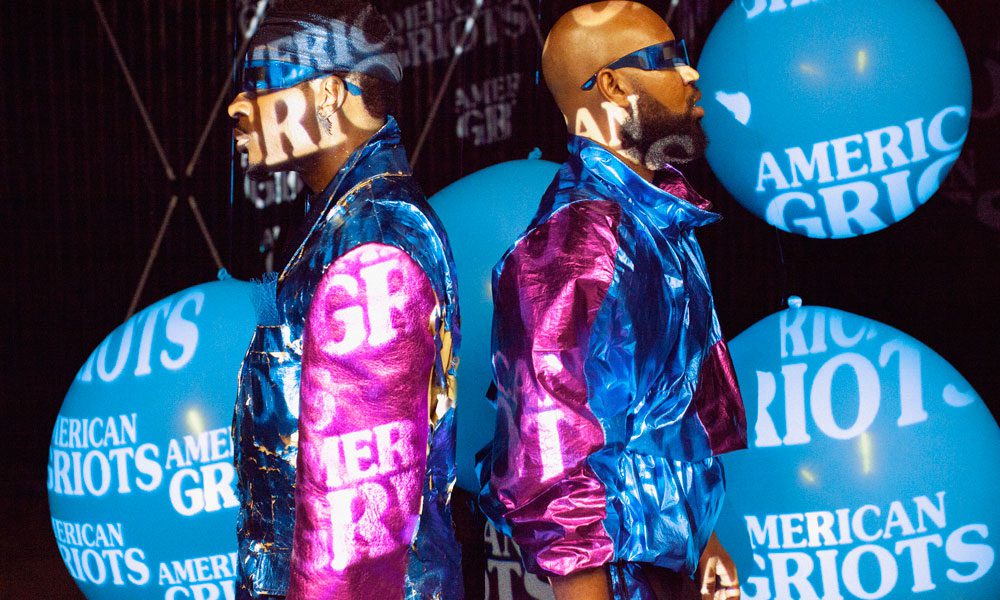

Aaron Lee Tasjan can still remember watching MTV for the first time while on summer vacation with his family, introduced to the music network by the local high school student his parents hired to babysit him and his sister. “There were two videos that really got me,” he professes. One was Soul Asylum’s “Runaway Train,” which captured his attention with its acoustic riffs, the other being The Black Crowes’ cover of Otis Redding’s “Hard to Handle.” After watching those videos, Tasjan says, “everything in the house became a guitar.” Tasjan happened to find a guitar pick on the floor left behind by a previous guest, which he took as a sign. “I treasured that guitar pick,” he says with emphasis. “I was just so fascinated with it.”
Fate would intervene again four years later when Tasjan’s family relocated to Southern California. A young Tasjan was at Vons grocery store with his mother when he spotted a small guitar shop next door offering lessons (the first was free, a sign announced). The aspiring musician convinced his mother to let him take a lesson, furthering his passion for the instrument.
The family later moved to Ohio; at the age of 16, Tasjan was invited to sing a folk song he wrote about peace at his school’s Columbine remembrance day event. The song led Tasjan to a life-changing opportunity to perform at a safe school conference in Ohio hosted by Peter Yarrow (of Peter, Paul and Mary). Yarrow was so moved by Tasjan’s song that he invited Tasjan onstage to sing the Grammy-winning trio’s hit cover of Bob Dylan’s “Blowin’ in the Wind.” That same year, Tasjan flew to New York with the Columbus Youth Jazz program and won the outstanding guitarist award at the Essentially Ellington High School Jazz Band Competition & Festival.
Each of these moments represent a seed planted in the music connoisseur, who’s since flourished into a genre-blending artist with his infusion of psychedelic-rock-meets-interstellar-pop. “My sound is informed mostly by what moves me. I never really thought of music in terms of genre,” he explains. “I have been touching all these different styles of music since I was a kid. It was just that way for me and always has been. All of these things are intentional and they’re done with purpose, and I think that’s why I seem to be able to do different styles of things that still connect with people.”
That’s evident on Tasjan’s brilliant – and most personal to date – solo album Tasjan! Tasjan! Tasjan!, out February 5 via New West Records. Introduced with a three-part video series that positions Tasjan as an alien lifeform kept awake by rock ‘n’ roll transmissions in “Up All Night,” searches the universe to fulfill his musical destiny on “Computer Love,” and takes stock of his journey, ultimately beaming his own unique sound into the cosmos with “Don’t Overthink It,” the record is a culmination of both Tasjan’s journey and his retro sensibilities.
Tasjan began honing his sound in earnest after ditching a scholarship at Berklee College of Music and moving to New York at the age of 20, where he met future pop hit songwriter Justin Tranter. The two formed Semi Precious Weapons, alongside Cole Whittle and Dan Crean, in late 2008. In large part to his connection to Tranter, Tasjan became immersed in queer culture, disclosing that he knew at an early age he was queer, yet wasn’t self-aware enough to understand it at the time. “I just knew that I seemed to be attracted to all different kinds of people and I didn’t know what that meant,” Tasjan remarks of having romantic experiences with men and women while in high school. “I never really defined that or thought of that as ‘I need to figure this out’ or anything like that. It was something that felt natural to me, to be able to fall in love with people that captured me in some way.”
Tranter was instrumental in helping to broaden Tasjan’s horizon when it came to queer culture; he’d watch in awe as Tranter orchestrated photo shoots while indie designers Tommy Cole and Roy Caires of fashion brand Alter (formerly known as This Old Thing?) designed the outfits the band wore on stage. The two also attended several drag shows together, Tasjan marveling at the art of performance – and later referencing his relationship with one of the queens in “Up All Night.” “They weren’t just doing this performance, they were living this performance. It gave you a whole new sense of what it meant to really be authentic within the context of whatever it is you’re trying to present in art, but to really come at it with intention and a desire to be seen,” he observes, adding that Tranter pulled inspiration from drag shows into the band’s live shows.
Tranter and Tasjan also experienced the discriminatory side of being openly queer. Tasjan recalls how Tranter would be chased down the street after coming out of a club in certain pars of town, and recounts a frightening experience when the two were chased by a man in his car. “That was not an uncommon part of [Tranter’s] life. Because I was his partner musically and we had this band together, those moments just broke your heart, largely in a way because they felt too common,” Tasjan reflects, adding that he’s been met with a fair share of disapproving looks that were “always interesting.”
In the fertile Lower East Side club scene, they met rising burlesque performer Stefani Germanotta, sharing bills in small LES venues with her as she developed her electronic pop persona Lady Gaga; Semi Precious Weapons would go on to open as special guests for lengthy stretches of her Monster Ball Tour, once her first singles catapulted her to fame. But by then, Tasjan had left Semi Precious Weapons to perform as the lead guitarist for New York Dolls, and formed his own band, The Madison Square Gardeners, before eventually moving to Nashville in 2013.
Staying true to his identity is embedded in Tasjan’s DNA, exemplified by the autobiographical single “Feminine Walk.” Describing the song as “the naked truth,” the song comes halfway through Tasjan! Tasjan! Tasjan!, which the artist says he recorded some 22 songs for, filtered down to 11 that “happened to be the ones where I was really singing about me,” he notes, adding that the subject matter of “Feminine Walk” “doesn’t leave room for guessing” in terms of its subject matter. Tasjan candidly sings, “I get one look, two look, three look, four, every time I’m at the bathroom door,” and though the track is ultimately celebratory in feel, he admits the song served as a “good opportunity to use my creativity to challenge my fear beliefs,” he says. “Everything kind of fell out because it was always there. It was like it was just waiting to happen the right way.”
Tasjan entered the writing process with a vivid childhood memory of walking down the street with his dad when he was no older than eight, donning a ’70s style bowl cut and an “androgynous” look that prompted an older child to stop the father-son pair and ask “is that a boy or a girl?” while pointing at the young Tasjan. He recalls another experience in a Denver airport as an adult, standing at the sink in the men’s bathroom washing his hands wearing jeans, a pea coat and hat when another man walked in and saw him, immediately walking out with a spooked look on his face. Moments later, he returned, laughing and saying that he initially thought he walked into the wrong bathroom. Tasjan laughs himself as he recites the memories, void of any animosity or bitterness. “My sense is more that they’re intrigued by it, and that’s what’s angering them more so than who I’m being,” Tasjan points out, using the song to investigate the curiosity of how people carry themselves and the impression it makes on others.
“I thought about that in my life and how some people have these qualities that seem to capture others in all sorts of different ways, but for some reason, people are captured by the way that somebody looks sometimes whether it’s for a good reason or a bad reason,” he muses. “I just happen to be one of those people. Everybody at some point in time has felt insecure about the way in which they’re perceived – we’ve all had an experience like that.”
“I like songs that I feel like are a part of the cannon, a part of the conversation of music that’s been happening for a long time. That song to me felt like it could be a part of that because I wasn’t sure that I had heard a song before where I had heard somebody say it quite like that. So that made me feel like ‘this is a good road to go down with this one,’” he adds.
“Feminine Walk” allows Tasjan to explore the differences in perception that often translate into vulnerability – and that exploration doesn’t end with those anecdotes. Tasjan shares another distinct memory from his youth when he proudly invited his classmates on the playground to gather around as he attempted to do his impression of Michael Jackson’s famous moonwalk, feeling a sense of accomplishment when his peers asked him to do it again, only to realize they were actually making fun of him. It’s a moment that Tasjan says draws a parallel to his life as a performer, inviting people in to explore and immerse themselves in his wonderment – wholly accepting the genuine reactions from each individual.
“People’s perception of everything is going to be colored by their own experience, so you put yourself out there knowing that. It’s not really yours to create the experience for someone else – you have to allow them to have that experience on their own, which means it’s going to take on a different meaning than whatever it was that you intended, and I think you just have to be cool with that,” he observes.
“I seek out these moments purposely. There’s something about testing how far is too far, how much is too much. Something about that does inspire me creatively, or makes me feel like I’m pushing myself into a place that I haven’t been yet,” he says. “That’s my goal to do that on every record.”
Follow Aaron Lee Tasjan on Facebook and Instagram for ongoing updates.




